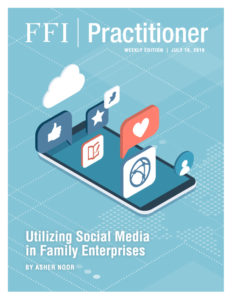
View this edition in our enhanced digital edition format with supporting visual insight and information.
Today’s edition kicks off a series of FFI Practitioner articles by members of the Editorial Committee. Thanks to this week’s contributor, Asher Noor, for this article examining the use of social media by family enterprises and providing three unique ideas for members of the earlier generation to engage on social media platforms. #WeHopeYouEnjoy
When it comes to using social media for business, there seems to be an overwhelming majority of the earlier generation which assumes that it’s best to either shun it or leave it to the expertise of the younger generation. #IDontBuyThat
Social media can be defined as using online communication platforms, where users park their generated content or share (and re-share) existing resources from elsewhere. It could be in the form of comments, articles, online profiles, uploading videos and pictures, tweeting, etc.
Social media has been around for the better part of the past two decades but it has still not gone mainstream in family enterprises on a scale that maybe some other aspects of the fourth industrial revolution have.
Today, what many family offices (especially single family offices) have, is at best a discreet one-page webpage – possibly grudgingly uploaded. It seems to be more of a placeholder for their domain name than anything else.
TYPICAL PROS AND CONS
There are certain benefits of utilizing social media in businesses that go without saying. These include brand awareness, competitive edge, networking and client engagement, reduced conventional marketing spend, and real time market research and feedback.
There are certain pitfalls when it comes to social media in businesses as well. It requires immediate, daily, and continuous monitoring; oversharing may risk compromising value or the competitive edge; online feedback could be negative and one could easily fluff it big.
SOCIAL MEDIA AND THE EARLIER GENERATION
For the remainder of this article, I wish to highlight three unique ideas that family business advisors can use to make a case for social media usage when conversing with the earlier generation.
1. STORYTELLING
In using social media, earlier generations can share glorious anecdotes and snippets from their past, provide unparalleled access to the history of the family success story, and inspire budding entrepreneurs across the globe. In the new normal of today, narratives published online and storytelling of the family past and present glory are the go-to ways to preserve history in a user-friendly digital format. This storytelling also becomes the toolkit and go-to guide for the family’s incoming generations, who are otherwise shy to query the previous generation or will never get the chance to meet them. Social media, through storytelling, allows posterity and a bridge to the future.
On a lighter note, would you prefer your clients to be the mute, fading photographs over the fire place, or be like the magical portraits at Hogwarts that talk?
2. INFLUENCER
Legacy used to be created after the publication of an obituary. In today’s world, however, you don’t have to die to be judged as a legend. If you have content to share, there will be followers, and while sometimes less is more, that is not the case online. Social media content churn and engagement allows people who have something to say or share to command a significant number of followers. It allows people to become thought leaders in the topic of their choosing and preference. The influencer ability allows one not only to share opinions to millions with the click of a button, but also to monetize it.
On a lighter note, if nothing else, one can tweet outrage and bash the coddled, entitlement mindset of the new generation without ever really looking into the eyes of their own progeny.
3. ALTERNATIVE TO RETIRING
The ideal scenario often echoed by those passing the baton is that they will retire to an idyllic fishing village, travel the world, laze around all day, or finally take up a hobby. In reality, most miss the hum of the family business and being in the driving seat. Despair no more. Armed with merely a smart phone, there now exists an alternative to retiring. One can easily build contacts and social networks, and generate content online that can keep one productively engaged and give a useful sense of emotional well-being. It allows one to continue to have a voice, to be heard, and to converse in an age where face-to-face talk is going extinct. Social media’s biggest win is that it thwarts isolation.
On a lighter note, don’t fall for internet fraud. It’s implausible to win the lotto without buying the ticket.
CAVEAT
All said and done, setting a social media policy is similar to, for example, putting in place rules of entry into business for family members, long before those rules are needed. Best practices require that a social media policy be put in place long before getting onto the infobahn and creating an online password that is case sensitive, alpha numeric, has at least one special character, and is not the name of your pet!
About the Contributors

Asher Noor, ACFBA, is CIO & Group CFO with AlTouq Group, Saudi Arabia. A member of the FFI board and the FFI Practitioner editorial committee, Asher is also the faculty for GEN 501. He can be reached at asher@altouq.com.
About AlTouq Group
AlTouq Group is a Saudi Arabian family office established in the 1970’s as an investment vehicle for the AlTouq family. It has grown into a sophisticated local and international investor with a global revenue generating asset base.

View this edition in our enhanced digital edition format with supporting visual insight and information.





